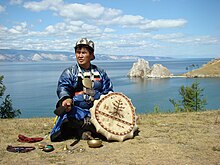
Indigenous religions is a category used in the study of religion to demarcate the religious belief systems of communities described as being "indigenous". This category is often juxtaposed against others such as the "world religions" and "new religious movements". The term is commonly applied to a range of different belief systems across the Americas, Australasia, Asia, Africa, and Northern Europe, particularly to those practiced by communities living under the impact of colonialism.
The term "indigenous religions" is usually applied to the localised belief systems of small-scale societies. These belief systems do not typically engage in proselytization, thus distinguishing them from movements like Christianity, Islam, and Buddhism that all seek converts and which are typically classified as "world religions". They are also often characterised as being distinct from the "world religions" because they are orally transmitted, intertwined with traditional lifestyles, and pluralist. Numerically, the majority of the world's religions could be classed as "indigenous", although the number of "indigenous religionists" is significantly smaller than the number of individuals who practice one of the "world religions".
Within the study of religion there has been much debate as to what the scope of the category should be, largely arising from debates over what the term "indigenous" should best encompass. For instance, the Japanese religion of Shinto is often referred to as an "indigenous religion" although, because the Japanese are not a colonised society but have colonised neighbouring societies like that of the Ainu, there is debate as to whether they meet the definition of "indigenous". In some cases, practitioners of new religions like Heathenry have sought to present theirs as "indigenous religions" although have faced scepticism from scholars of religion.